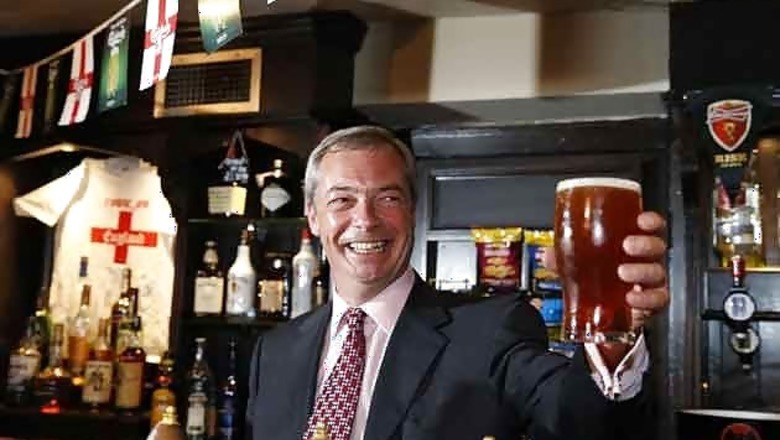
views
New Delhi: This appears to be a season for electoral forces of nature around the world. While we mull over the BJP tidal wave that swept through India and Thailand tries to steady itself after a coup, Britain's polity is contemplating the 'UKIP earthquake' as it has come to be called. The new party's continued gains in local elections this week spell the beginning of major changes in that country's politics.
The United Kingdom Independence Party is curiously named and begs the question: independence from what? UKIP was formed in 1993 with the coming together of several groups opposed to Britain's membership of the European Union, and this Euroscepticism has been at the base of the party's ideology ever since. Over the years, it has formulated other points of importance for British citizens, building on a right-wing image. Thus, it is a committed supporter of the country's constitutional monarchy. It supports same-sex civil partnerships but opposes gay marriage on the grounds that legalisation would force religious groups and places of worship to conduct such marriages, which it holds as violation of religious freedom. It is also skeptical of green movements and the current climate change theories.
After more than 25 years of being at best a fringe group, the UKIP found a new lease of life with the global recession. As jobs dried up and the economy faltered, UKIP's ideology found new takers both among those who were beginning to move away from the political Centre, and working class Conservative voters who felt they needed a new voice.
Of interest to Indians and other expatriates in Britain is UKIP's consistent stand against immigration. Till recently, it supported a five-year freeze on citizenship by naturalisation, and has hardened its stand on illegal immigration. On the other important matter of work permits for legal immigrants, UKIP has supported a points-based system relying on the skill sets and qualifications of the applicant. In an apparent contradiction, UKIP also proposes that EU citizens resident in Britain for 7 years can apply for citizenship. Since this category is ethnically white, while non-EU immigrants are not, UKIP has had to defend its policy by claiming that if it comes to power, immigration will be based on skills, not country of origin.
UKIP's anti-immigration stand has been the most criticised among its policies, with both the British Left and Right accusing its policies of being unclear in terms of implementation. The party has recently announced a review of its immigration policy but it is unlikely to soften its demand for immigration curbs.
Meanwhile, its rapid gains across Britain since 2008 have made everyone sit up and notice. At the national level, it is still a minor player, with just three seats in the House of Lords, none in the House of Commons, a lone seat in the Assembly of Northern Ireland, and with just 9 out of the 73 representatives the country sends to the European Parliament. Naturally, UKIP has few fans in Brussels.
But it is at the local levels that the party has made the most significant stride. From a mere 8 seats, it soared up to 147 in local council and metropolitan elections in 2013, becoming the fourth largest party after the two big ones and the Liberal Democrats. Its vote share was even more impressive: in an election where Labour topped at 29 per cent, and the Conservative Party plateaued at 25 per cent, UKIP got 23 per cent of the votes and came third, proving the point that it was gaining from disaffected Conservative supporters looking for a non-Left option.
That was a year ago, and in the 2014 local elections, it has won 155 seats, proving the 2013 results were not a flash in the proverbial pan. The one place it hasn't made the progress it expected was in London council seats, which it blamed on the liberal voters of metropolitan London. In making gains across England, UKIP also wrested seats from all three bigger parties. UKIP leader Nigel Farage announced the results were a prologue to his party's stellar performance in next year's general elections.
The UKIP earthquake has already caused heads to roll, or totter at the very least. The Conservatives have lost 201 seats in the councils where results have been declared as we speak, while Liberal Democrats have lost 284 seats. Liberal Democrat members have started a petition demanding the removal of party leader Nick Clegg, saying whoever will lead their party in 2015, "it is clear to us that this person is not you, as the loss of so many of our hardworking councillors highlights."
A strong fourth party hasn't been around in Britain since 1945, and UKIP's advance causes a radical rethink in the way politics will be conducted in Britain at such a crucial period. And if the party repeats its performance in Parliamentary elections in 2015, considering its policies and stand on major issues including immigration, we might witness a major change in the way Britain conducts its affairs. This will have repercussions for everyone. Clearly, the current global economic scene is conducive for right wing parties to grow.




















Comments
0 comment